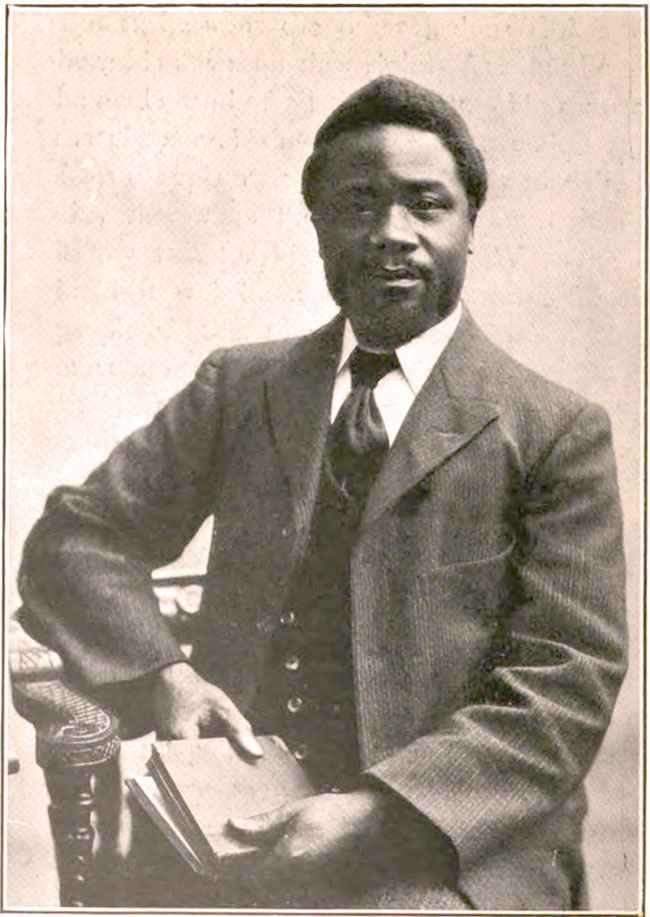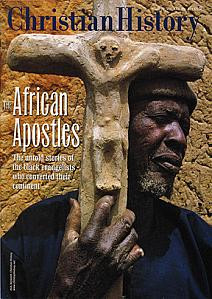NLEMVO’S FAITH AND SKILL PRODUCED PRAISEWORTHY RESULTS IN THE CONGO

[Above: Don Zwau M. D. Nlemvo; [public domain] photo by Albert Hester in H[endrina] M[argo] Bentley’s biography, W. Holman Bentley; the Life and Labors of a Congo Pioneer. London: The Religious Tract Society, 1907, at p. 343]
MANTANTU DUNDULU was a hero in everyday life and in the kingdom of Christ. Reared by an uncle, who was a tribal chief (the boy’s father was not in the picture for reasons not entirely clear), he fiercely protected his three sisters. In 1881, as a young man of about eleven, he became the personal assistant of Baptist missionary William Holman Bentley.
This position changed his life in ways he could hardly have anticipated. For starters, about a year after Mantantu entered Bentley’s employ, on this day, 30 April, 1882, he declared that he had become a Christian—possibly the first Protestant convert to Christianity in the Congo. As his people still worshiped fetishes and practiced demonic rituals, he was largely cut off from them. Bentley gave him a new name, Nlemvo, meaning “Obedient.” His former names had meant “sorrow” and “stupid.” When he was thirteen, he helped to rescue and carry a battered man who was to be burned to death for witchcraft.
Bentley taught Nlemvo to read English. His progress was rapid and, because he was fluent in the Kikongo language, he became the missionary’s close aide in preparing a dictionary and in translating the New Testament and portions of the old into that language. By 1884, the dictionary was nearing completion and Bentley returned to Britain to see it through press, taking fourteen-year-old Nlemvo with him to help with the finishing touches. Visiting European opened Nlemvo’s eyes to feats of engineering and culture he had not guessed possible. He was also present at Bentley’s marriage to Hendrina Margo Kloekers that year. He could not understand why she wore a “mosquito net” (veil) over her face, but Margo became a second mother to him.
Bentley remained in Britain until 1886, but Nlemvo returned home to set at rest his tribe’s fears that he had been sold into slavery. When his uncle died in 1887, Nlemvo rejected his people’s request that he become their chief. The role would have required him to participate in pagan ceremonies. When some of the tribe hinted darkly that he must be a witch who was trying to destroy them by rejecting the old customs, he returned to Bentley’s mission station. He was baptized and married Kalombo, whom missionaries had rescued from slavery and whom he had led to Christ. They had children. After her death, he married again (his second wife’s name is unknown) and had more children. Meanwhile, with his own hands he helped build a Christian village and manage its finances and provide leadership.
During the following years he explored the Congo with Bentley and other missionaries, often facing danger and hostility with them. Everywhere he went he helped make converts to Protestant Christianity. He visited Europe again in 1893 and translated The Peep of Day, religious instructions for children. In 1898, he visited again to help Bentley put more books through press. Margo Bentley wrote,
While we were home on furlough in 1898 my husband succeeded in passing through the press, the Congo Grammar, Appendix of the Dictionary, and Congo Testament, every word of which had been subjected to Nlemvo’s keen criticism, who had been his helper in the language from the very first, and knew English well enough through having been to England three times and studied the language very carefully.
Nlemvo founded a drum and fife band, learning to play the cornet. He continued to assist with translation even after he became blind. Although he learned to read braille, he also had others read aloud to him. Increasingly he was viewed as an elder statesman and people sought him out to resolve disputes and render judgments. By his death in 1938, about 200,000 Congolese had converted to Protestant faith.
—Dan Graves
----- ----- -----
For more on notable African Christian leaders read Christian History #79, African Apostles: Black Evangelists in Africa






